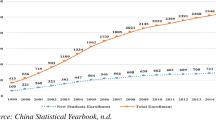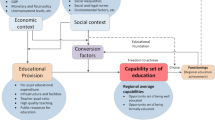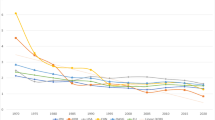Abstract
Education is one of the major linchpins of economic, social and political development of any nation. Recent evidence suggests that higher education can produce both public and private benefits. Thus, the role of the state in making education policy, and funding education is indeed critical, and cannot be left to be determined by market forces alone. Nevertheless, the trend of inadequate government funding for universities, loss of autonomy, infrastructural decay, falling academic standards, politicization and privatization of education, etc. appear to be a worldwide phenomenon and not just restricted to the developing world. South African higher education shows much promise with respect to knowledge production and dissemination, to contributing to social equity, economic and social development and democracy, and to the development needs of the Southern African region and the African continent. However, higher education in South Africa is under considerable stress from domestic and international trends that are redefining the nature and role of public sector post-secondary education (PSE) institutions worldwide. The paper will outline the role of PSE in the knowledge economy and the impact of the neoliberal context on the evolution of higher education in South Africa and the world. Given the significant developmental implications of investment in higher education, the authors argue that relegating this important public policy issue to the market forces is likely to promote inequality in the society, along with negative consequences for socio-political stability, economic sustainability, and knowledge generation.
Similar content being viewed by others
References
Acuna, R. (2013) What’s behind the Education Cuts? Conservative Ideology at Work, Vue Weekly, March 27, http://vueweekly.com/front/story/whats_behind_education_cuts/, Accessed on April 17, 2013.
Archambault, Leanna, M., & Barnett, Joshua H. (2010). Revisiting technological content knowledge: Exploring the TPACK framework. Computer and Education, 55(4), 1656–1662.
Banerjee, A., & Duflo, E. (2008). What is middle class about the middle classes around the world? Journal of Economic Perspectives, 22(2), 3–28.
Barber, Michael, Donnelly, Katelyn, & Rizvi, Saad. (2013). An avalanche is coming: Higher education and the revolution ahead. London: Institute for Public Policy Research.
Bawa, Ahmed & Johann Mouton (2002) “Research”, in Transformation in Higher Education: Global Pressures and Local Realities in South Africa (pp. 195–218). Cape Town: Centre for Higher Education Transformation.
Bentley, K., Habib, A., & Morrow, S. (2006). Academic freedom, institutional autonomy, and the corporatised university in contemporary South Africa. Pretoria: Council on Higher Education.
Benton, Stephen L. and Pallett, William H. (2013) Class size matters, Inside higher education, http://www.insidehighered.com/views/2013/01/29/essay-importance-class-size-higher-education#ixzz2UT4zq5hj, Accessed on May 26, 2013.
Bloom, D., David C., and Kevin C. (2005). Higher education and economic development in Africa, http://siteresources.worldbank.org/EDUCATION/Resources/278200-1099079877269/547664-1099079956815/HigherEd_Econ_Growth_Africa.pdf (Accessed on March 28, 2013).
Bussolo, M., De Hoyos, R. E., Medvedev, D., & van der Mensbrugghe, D. (2007). Global growth and distribution: Are China and India reshaping the world? World bank policy research working paper no. 4392. Washington, DC: World Bank.
Calvert, Jane, & Martin, Ben R. (2001). Changing conceptions of basic research? Background document for the workshop on policy relevance and measurement of basic research Oslo 29–30 October. Brighton: Science and Technology Policy Research.
Castells, M. (2001). Universities as dynamic systems of contradictory functions, In müller, J., Cloete, N, & Badat, S. (eds), Challenges of Globalisation: South African Debates with Manuel Castells (pp. 206–223). Cape Town: Maskew Miller Longman.
CBO (Congressional Budget Office) (2011). Trends in the distribution of household income between 1979 and 2007, October, http://www.cbo.gov/sites/default/files/cbofiles/attachments/10-25-HouseholdIncome.pdf, Accessed on March 28, 2013.
Chun, N. (2010) Middle class size in the past, present, and future: A description of trends in Asia, ADB Economics Working Paper Series, No. 217, September 2010. Manila: Asian Development Bank.
Department of Basic Education (DoE). (2010). Education statistics in South Africa 2009. Pretoria: DoE.
Dewey, J. (1897). My pedagogic creed. School Journal, 54, 77–80.
dos Remedios, Cris. (2000). The value of fundamental research: A discussion paper for the international union for pure and applied biophysics. Sydney: IUPAB.
du Toit, A. (2000). From autonomy to accountability: Academic freedom under threat in South Africa. Social Dynamics, 26, 76–133.
Duke University (2013). Bioelectricity: A quantitative approach—Duke University’s First MOOC, February 5, http://dukespace.lib.duke.edu/dspace/bitstream/handle/10161/6216/Duke_Bioelectricity_MOOC_Fall2012.pdf, Accessed on April 19, 2013.
Exeter, D. J., Ameratunga, S., Ratima, M., Morton, S., Dickson, M., Hsu, D., et al. (2010). Student engagement in very large classes: The teachers’ perspective. Studies in Higher Education, 35(7), 761–775.
Flood, RR., & Rosalind G. (2010). Breaking the silence: The hidden injuries of the Neoliberal University” in secrecy and silence in the research process: Feminist reflections (pp. 228–244). London: Routledge.
Friedman, Milton, & Friedman, Rose. (1980). Free to choose: A personal statement. New York: Harcourt, Brace and Jovanovich.
Goldin, C. (2001). The human-capital century and American leadership: Virtues of the past. Journal of Economic History, 61(2), 263–290.
Goldin, C. & Lawrence F. K. (2010) The race between education and technology. Cambridge: Harvard University Press.
Harkin Report (2012). For profit higher education: The failure to safeguard the federal investment and ensure student success. http://www.help.senate.gov/imo/media/for_profit_report/Contents.pdf, Accessed on April 16, 2013.
Heckman, J., & Klenow, P. (1997). Human capital policy. Chicago: University of Chicago.
Hornsby, D., Ruksana, O. & Jacqueline De, M.-A. (2013). Large class pedagogy: Interdisciplinary perspectives for quality higher education (forthcoming).
IMF. (2011). World economic outlook. Washington: International Monetary Fund.
International Education Association of South Africa (IEASA). (2012). Higher education in context: Study South Africa-the guide to higher education in South Africa (12th ed.). Pretoria: IEASA.
Jeppesen, S. & Holly, N. (2012). Beyond academic freedom: Canadian neoliberal universities in the global context, TOPIA: Canadian Journal of Cultural Studies: Out of the Ruins, the University to Come, Number 28, Fall, 87–114.
Kaminski, R., Stormshak, E. A., Good, R., & Goodman, M. R. (2003). Prevention of substance abuse with rural head start children and families: Results of project STAR. Psychology of Addictive Behaviors, 16, S11–S26.
Kharas, H. (2010). The emerging middle class in developing countries, working paper No. 285. Paris: OECD Development Centre.
Kofmel, K. (2013). Canada’s education brand gets funding boost to help attract students from abroad, Edmonton Journal, 29 March, http://www.edmontonjournal.com/news/national/Canada+education+brand+gets+funding+boost+help+attract/8171578/story.html, Accessed on April 17, 2013.
Korn, M. (2013). Big MOOC coursera moves closer to academic acceptance, Wall Street Journal, February 7, http://online.wsj.com/article/SB10001424127887324906004578288341039095024.html, Accessed on April 18, 2013.
Krugman, Paul. (2007). The conscience of a liberal. New York: W. W Norton and Company.
Krugman, P. (n.d). Inequality and crisis: Coincidence or causation, http://www.princeton.edu/~pkrugman/inequality_crises.pdf, Accessed on March 28, 2013.
Lewin, T. (2013). Universities abroad join partnerships on the web, The New York Times, February 20, http://www.nytimes.com/2013/02/21/education/universities-abroad-join-mooc-course-projects.html?_r=0, Accessed on April 18, 2013.
Manches, A., Barry P., Charles C., Ian C., & Mike S. (2010). Year three final report: Shaping contexts to realise the potential of technologies to support learning, CAPITAL—Curriculum and Pedagogy in Technology Assisted Learning, mimeo.
Mulryan-Kyne, C. (2010). Teaching large classes at college and university level: Challenges and opportunities. Teaching in Higher Education, 15(2), 175–185.
Noah, T. (2013). The great divergence: America’s growing inequality crisis and what we can do about it. NY: Bloomsbury Press.
OECD (Organization for Economic Co-operation and Development) (2011). Divided we Stand: Why inequality keeps rising, country note—Canada, http://www.oecd.org/els/socialpoliciesanddata/49177689.pdf, Accessed on March 28, 2013.
Okome, M. O. (2007). Globalization and the political economy of higher education in Nigeria. http://mojubaolu.blogspot.com/2007/12/globalization-and-political-economy-of.html (Accessed on March 28, 2013).
Ortiz, I., & Mathew C. (2013). The age of austerity: A review of public expenditures and adjustment measures in 181 countries. Initiative for Public Dialogue and the South Centre Working Paper, March, http://www.southcentre.org/, Accessed on April 16, 2013.
Psacharopoulos, G., & Harry A. P. (2002) Returns to investment in education: A further update, policy research working paper 2881 (The World Bank Latin America and the Caribbean Region Education Sector Unit).
Psacharopoulos, G. (2004). Economics of education: From theory to practice. Brussels Economic Review, 47(3/4), 341–357.
Ravallion, M. (2009). The developing world’s bulging (but vulnerable) middle class. World Development, 38(4), 445–454.
Saunders, D. B. (2010). Neoliberal ideology and public higher education in the United States. Journal for Critical Education Policy Studies, 8(1), 41–77.
Sharma, S. (2012). Rising inequality in South Africa: Drivers, trends and policy responses, discussion paper, consultancy africa intelligence, 16 October, http://www.consultancyafrica.com/index.php?option=com_content&view=article&id=1142:rising-inequality-in-south-africa-drivers-trends-and-policy-responses-&catid=87:african-finance-a-economy&Itemid=294, Accessed on April 17, 2013.
Shrivastava, M., & Stefanick, L. (2014). Of democracy and its deficits: Surviving neoliberalism in oil-exporting economies. In M. Shrivastava & L. Stefanick (Eds.) Beyond the rhetoric: Democracy and governance in a global north oil economy. Athabasca University Press (forthcoming).
Tilak, J. B. G. (2003). Higher education and development. In J. P. Kleeves & R. Watanabe (Eds.), Handbook on educational research in the Asia Pacific region (pp. 809–826). Dordrecht: Kluwer Academic Publishers.
UNESCO (2000). Dakar framework for action—education for all: Meeting our collective commitment http://www.unesco.org/education/efa/ed_for_all/dakfram_eng.shtml (accessed on September 26, 2011).
Venniker, R. (2001). Social returns to education: A survey of recent literature on human capital externalities. CPB (Netherlands Bureau for Economic Policy Analysis) Report 00/1.
Watson, Deryn. (2001). Pedagogy before technology: Re-thinking the relationship between ICT and teaching. Education and Information Technologies, 6(4), 251–266.
Watters, A. (2012). Unbundling and unmooring technology and the higher ed tsunami, Educause Review Online, September, http://www.educause.edu/ero/article/unbundling-and-unmooring-technology-and-higher-ed-tsunami, Accessed on April 18, 2013.
Wolff, E. N., & Gittleman, M. (1993). The role of education in productivity convergence: Does higher education matter? In A. Szirmai, B. van Ark, & D. Pilat (Eds.), Explaining economic growth (pp. 65–77). Amsterdam: North-Holland.
World Bank. (2002). Constructing knowledge societies: New challenges for tertiary education. Washington DC: World Bank.
World Bank (2012) KEI and KI indexes, http://info.worldbank.org/etools/kam2/KAM_page5.asp, Accessed on March 28, 2013.
World Bank (2012) South Africa economic update: Focus on inequality of opportunities, 24 July, http://graphics8.nytimes.com/packages/pdf/world/South-Africa-issue3-report-20120723.pdf, Accessed on April 17, 2013.
Yalnizyan, A. (2010). The rise of Canada’s richest 1%. Ottawa: Centre for Policy Alternatives, Mimeo.
Author information
Authors and Affiliations
Corresponding author
Rights and permissions
About this article
Cite this article
Shrivastava, M., Shrivastava, S. Political economy of higher education: comparing South Africa to trends in the world. High Educ 67, 809–822 (2014). https://doi.org/10.1007/s10734-013-9709-6
Published:
Issue Date:
DOI: https://doi.org/10.1007/s10734-013-9709-6




